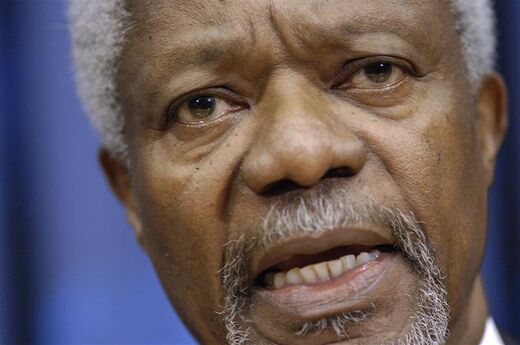
Yet Another United Nations Scandal
UN Secretary General Kofi Annan has finally left the building, but what a terrible mess he left on the floor behind him. It includes billions of dollars in fraud perpetrated through the Iraqi oil-for-food program, the rape of minors in the Congo sex scandal, and a procurement scandal that suggested hundreds of millions more international dollars were funnelled to unworthy causes through the United Nations under his watch.
Now the Wall Street Journal (wsj) has one more cold shower for the departing Annan.
Apparently, no one has been watching the dollars the UN sends the nuclear-powered North Korea.
In this latest scandal, dubbed “Cash for Kim” by the wsj, no one really knows how much money has been misused. Much like Kim Jong Il’s response to nuclear weapons inspectors (he banished them), North Korea has refused to allow UN officials to visit the sites financed by the UN Development Program (undp). In some cases, there is no evidence the sites exist at all. The North Korean government insists on receiving all funds in hard cash, so accountability is difficult to maintain.
The numbers aren’t known because no one in the UN or North Korea will provide them, but an internal 1999 audit “notes a budget of $27.9 million for 29 projects” (Wall Street Journal, January 19). One source suggests the program may have spent more than $100 million.
undp allowed many rules to be broken. For instance, many of the staff in undp’s main offices in Pyongyang were selected by North Korea. A 2004 audit notes: “The government provides only one candidate for each post and does not provide detailed qualifications, work experience or personal details to the office.” The reccomendation that undp recruit its own staff was rejected on Dec. 15, 2006. The salary for these people is paid—as required by North Korea—directly to the Pyongyang government, which, as wsj asserts, is probably taking a cut. While a 1999 audit shows that the checkbook is not kept in a secure location and that no check register is maintained at all, it doesn’t really matter: The undp pays everything—even the $2 million per annum North Korea charges for office rent—in cash. No records come out of those transactions either because they don’t use purchase orders.
There are 30 undp projects currently running in North Korea, but Pyongyang will not allow foreign visitors at prohibited sites, so they audit internally. Ambassador Mark Wallace of the U.S. Mission to the UN noted in a January 16 letter to undp associate administrator Ad Melkert that “it is impossible for undp to verify whether or not any of the funds paid to the dprk [Democratic People’s Republic of Korea] for supposed use in undp programs have actually been used for bona fide development purposes or if the dprk has converted such funds for its own illicit purposes.”
None of this should be terribly surprising, considering the UN’s track record. The oil-for-food scandal cost billions of dollars—some of which may have ended up in the hands of terrorist organizations; in terms of dollars, this was quite possibly the biggest con job in the history of mankind. Even more sickening, the Congo sex scandal continued for over a year even after UN officials had knowledge of allegations that their peacekeepers had raped children as young as 12 along with numerous other sex crimes.
Here’s a question: What does any of this have to do with the UN’s original mandate, to stop “the scourge of war”? How did an organization that was built to prevent mankind from destroying itself manage to become the number-one target for international con men but fail to actually prevent combat? Remember: During the period in question, North Korea found enough spare money to successfully develop nuclear weapons.
Recognized and respected by leaders around the world, Herbert W. Armstrong attended the San Francisco Conference in 1945 at which the UN was formed. Mr. Armstrong wrote that at this conference, he heard chiefs of state “ring out the warning that this was the world’s last chance.” He went on to write, in his booklet The Wonderful World Tomorrow—What It Will Be Like, “But it has failed. The United Nations has no power over the nations. It has no power to settle disputes, stop wars or prevent wars. … Man has failed his last chance! Now God must step in—or we perish!”
By now, the problem should be obvious: Mankind simply cannot rule itself. The choices that even the highest leaders make are generally based on greed and a way of life that cannot bring peace or happiness. The UN, built on a mandate of peace, is still at its core deceitful, greedy, and crippled by the evil influence of human nature. The UN might be designed to keep the peace between national governments as an international authority, but how sickening its failure is! What a powerful demonstration of the complete inability of man to rule successfully over man.
As Mr. Armstrong said, “God must step in—or we perish!”
